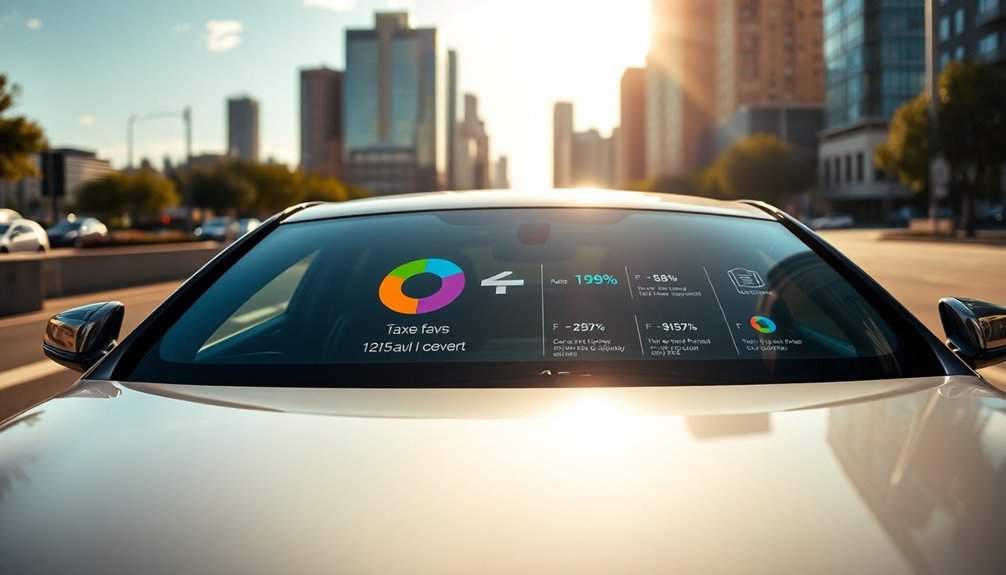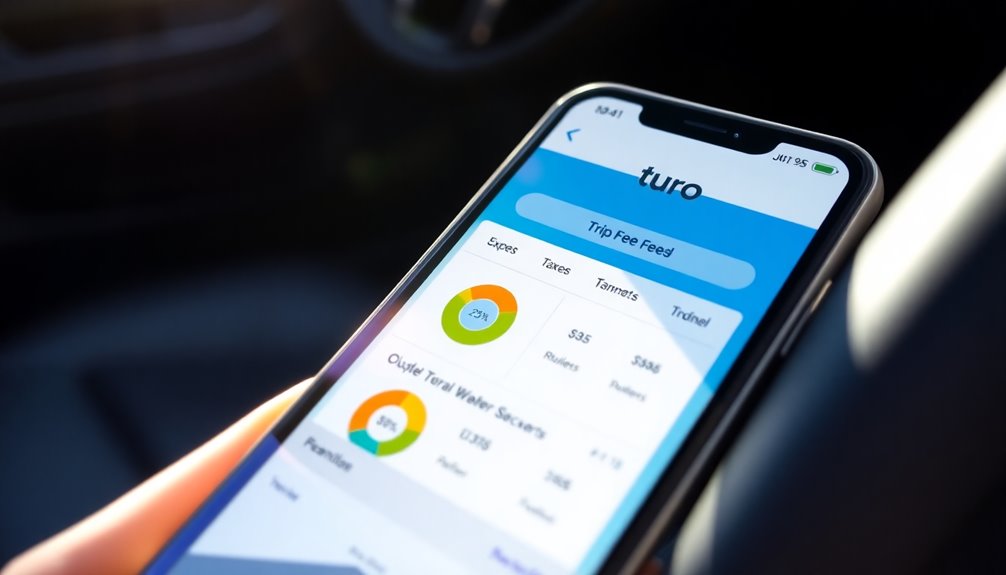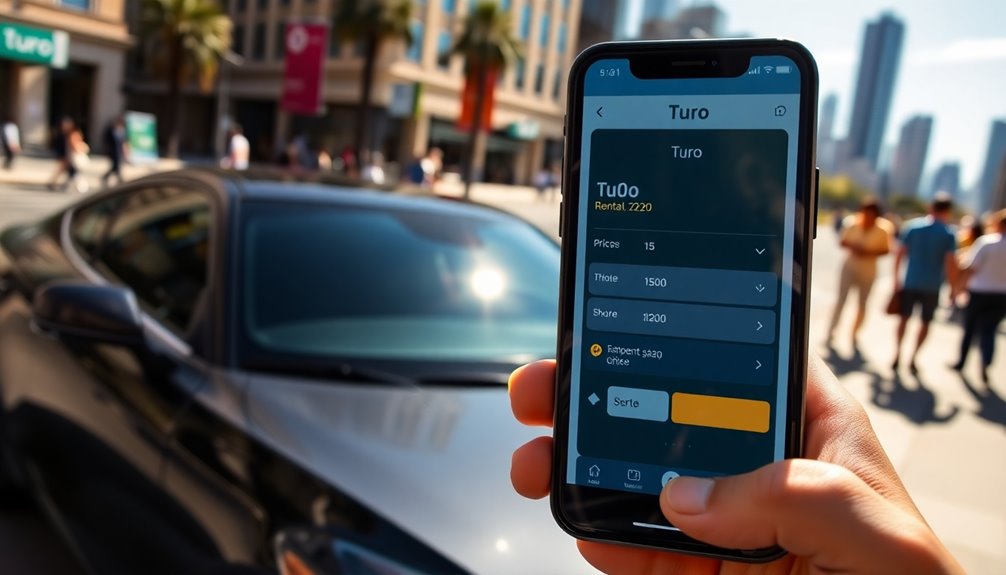When you rent a car on Turo, fees can vary significantly. You'll typically face trip fees ranging from 2.5% to 100% of your rental price, depending on factors like vehicle value and trip length. If you're under 25, expect additional young driver fees ($50/day for those under 21 and $30/day for ages 21-24). Plus, various fees like airport or pickup charges can inflate costs. For hosts, income taxes on earnings can range from 10% to 37%, and they must report all income. Understanding all these details is key to budgeting effectively, and there's more to discover about Turo's fee structure.
Key Takeaways
- Turo trip fees range from 2.5% to 100% of the trip price, depending on vehicle value and rental duration.
- Young driver fees are $50/day for under 21 and $30/day for ages 21-24, added to total rental costs.
- Hosts must report all Turo earnings for taxes, subject to federal and state rates between 10% to 37%.
- Deductible expenses for hosts include Turo fees, vehicle maintenance, and depreciation, aiding in tax obligations.
- Turo's optional protection plans vary in cost from 15% to 100% of the trip price, affecting liability and deductibles.
Overview of Turo Fees

When using Turo, you'll encounter several fees that can significantly impact the overall cost of your rental. Trip fees typically range from 2.5% to 100% of the overall price and are calculated based on factors like trip duration and vehicle value.
You'll see these fees upfront when comparing prices, but keep in mind they can be higher for shorter trips and lower for longer ones. The lead time of your booking also influences these fees. Turo's popularity surged during COVID-19 due to high rental car prices, which has made understanding these fees even more crucial for renters.
If you're under 25, be prepared for young driver fees. For drivers under 21, it's a minimum of $50 per day, while those under 25 face a $30 daily fee. These charges vary by vehicle and country, but they're mandatory.
Miscellaneous fees can add to your costs, including airport fees or extra charges for optional services like unlimited mileage.
You might also encounter reimbursement bills for fuel, distance overages, or even cleaning violations. Always read the fine print, especially regarding local taxes and any facility charges, to avoid unexpected expenses.
Understanding these fees helps you budget better for your Turo experience.
Understanding Taxes for Hosts

As a Turo host, understanding your tax obligations is key to managing your rental business effectively. You need to report your business earnings on your income tax return each year, as this income is subject to federal and state taxes. Federal rates range from 10% to 37%, depending on your earnings. If you earn more than $600 in a year, you'll likely receive a Form 1099-K from Turo.
You can also deduct various expenses related to your rental activities. These can include Turo fees, cancellations, vehicle expenses like gas and maintenance, and even marketing costs. Remember, while host incentives from Turo are part of your gross income, you can offset them with deductions. Additionally, deductible expenses may include insurance, maintenance, and vehicle depreciation, which can significantly reduce your taxable income.
If you materially participate in your Turo business, your net profits will incur a self-employment tax of 15.3%. Whether you materially participate will influence the tax forms you need to file.
Be sure to keep accurate records for calculating your quarterly estimated tax payments if your expected annual tax liability exceeds $1,000. Failing to make these payments on time can lead to penalties. Consulting a CPA is always a smart move for clarity on your tax situation.
Turo Trip Fee Breakdown

Turo trip fees are an essential part of your rental costs, and understanding how they're calculated can save you from surprises. These fees are based on a percentage of the trip price, typically ranging from 13.5% to 17.5% of the pre-sales tax rental amount. The vehicle's value plays a significant role; higher-value cars incur steeper fees. Turo, often referred to as "Airbnb for cars(Airbnb for cars)," offers a unique peer-to-peer car rental experience that can influence the availability of various vehicles.
Booking in advance can lower your trip fee, while shorter rentals often lead to higher costs. Each trip's fee is unique, influenced by factors like trip duration and vehicle type. For example, renting a Tesla at $200 per day could add an extra $164 in trip fees.
This fee isn't included in the initial daily rate you see when searching, so it's crucial to factor it into your total rental cost. Additionally, sales tax and optional insurance costs can inflate your final price.
Keep in mind, the full breakdown of costs, including trip fees, only becomes clear during the booking process. Make sure to communicate with your host through the Turo app for any clarifications on additional charges, ensuring you know exactly what to expect.
Young Driver Fee Explained

If you're under 25, expect to see a young driver fee added to your rental costs. This fee applies to anyone renting a car through Turo who's under 25 years old.
Drivers aged 18-20 will pay a flat rate of $50 per day, while those ages 21-24 will incur a fee of $30 per day. These fees are mandatory and part of the total rental cost, not optional extras.
The reason for this fee is simple: younger drivers statistically have higher accident rates due to inexperience. This increased risk leads to higher insurance costs, which the fee helps to offset. The fee structure is determined by age at booking, not rental start date.
Importantly, the fee remains in effect even if you turn 25 during your rental period.
If you're looking to avoid or reduce this fee, there are a few options. For instance, an AAA membership can waive these fees through certain partnerships, while USAA members may find fee waivers at select rental companies.
Additionally, employer discounts or using alternative rental services like Silvercar or Getaround can help you skip the fee altogether.
Optional Protection Plan Costs

When renting a vehicle through Turo, you might want to consider the optional protection plans available, as they can significantly influence your overall rental costs.
There are three tiers of plans: Minimum, Standard, and Premier.
The Minimum Plan costs 15% of the trip price for rentals over $250, or 25% for those under $250, with a daily rate of at least $10. It offers state minimum liability coverage and a $3,000 deductible. Additionally, hosts must opt-in for a Turo incident information card to ensure compliance with rental policies.
The Standard Plan is a flat 40% of the trip price, with a minimum cost of $12 per day. It provides the same state minimum liability coverage but lowers the deductible to $500. However, this plan doesn't cover mechanical or interior damage.
The Premier Plan ranges from 65% to 100% of the trip price, with a minimum daily cost of $14. It offers up to $750,000 in liability coverage (or $1,250,000 in New York) and has no deductible.
Keep in mind, this option isn't available for drivers under 21 or for vehicles valued over $60,000. Choose wisely based on your needs and risk tolerance.
Additional Charges for Hosts

Understanding the additional charges that hosts can impose is crucial for a smooth rental experience. As a guest, you should be aware of the potential fees that could arise during your rental period.
For instance, if you return the vehicle late, you might face charges. A delay of 0-29 minutes won't cost you anything, but being 30 minutes to nearly two hours late could lead to a fee equal to half the average daily trip price. Late return reports can only be made starting 30 minutes after the scheduled trip end.
If you improperly return the vehicle, you'll incur a $50 fee. To avoid additional charges, make sure to request an extension through the Turo system if you need more time, as hosts can approve or deny these requests.
Mileage is another area where hosts can impose fees. If you drive beyond the agreed distance, expect charges based on the host's listing settings, and remember, they can bill you for extra miles up to 72 hours after the trip ends.
Hosts also have the right to charge for improper returns and must follow Turo's additional usage policy for all fees. Communicating with your host can help resolve any potential issues quickly.
Deductible Expenses for Hosts

Hosts can benefit significantly from knowing which expenses are deductible when renting out their vehicles on Turo. Understanding these deductions can help you maximize your earnings and minimize your tax liability.
First, vehicle-related expenses such as gasoline, oil changes, and repairs not covered by insurance are all deductible. If you financed your vehicle, the interest on the loan is also a deduction. For those with newer cars, vehicle depreciation offers a substantial tax break. If you lease your vehicle, those payments can be deducted as well.
Turo-specific fees, like service fees and cancellation refunds, are also deductible as business expenses. However, keep in mind that Host Incentives you receive from Turo are included in your gross income but aren't deductible. Additionally, general business expenses such as cleaning services, marketing costs for your car listings, and a portion of your cell phone and internet bills used for business can be deducted. It's important to remember that Turo hosts must report all income earned through Turo, even if they do not receive a 1099 form.
Additionally, track your business mileage and maintain logs for all your deductions. By knowing what's deductible, you can keep more money in your pocket while enjoying your Turo hosting experience.
Impact on Guests' Costs

Renting a vehicle on Turo can come with unexpected costs that impact what you ultimately pay. Trip fees, which can range from 2.5% to 100% of the overall price, are added on top of your rental rate. These fees, disclosed upfront during your search, vary significantly based on the vehicle type and other factors. High-value vehicles, like Teslas, typically incur higher trip fees.
If you're a young driver under 24, expect to pay additional fees—$50 per day if you're under 21 and $30 if you're under 25. Other costs may arise, such as airport fees, pickup or return charges, and extras like unlimited mileage. It's important to remember that vehicle eligibility requirements can also influence the types of fees associated with your rental.
Don't forget about potential fees for fuel replacement or tolls, which can quickly accumulate.
Cleaning and damage fees are another concern. If you violate Turo's cleaning policy, you might face a $150 cleaning fee plus a processing charge. Even minor spills can lead to disputes over these fees, as hosts can report issues to Turo for validation.
Importance of Fee Transparency

While navigating the Turo platform, you'll find that fee transparency plays a crucial role in your rental experience. Turo clearly displays rental prices, trip fees, and additional charges during the booking process, ensuring you know what to expect.
The trip fee, which varies from 2.5% to 100% of the overall price, is disclosed upfront. Additional expenses, like delivery fees and optional insurance, are also listed, helping you budget effectively. In contrast to traditional rental companies, Turo's pricing may vary significantly, so understanding these fees upfront can help you avoid surprises and make informed decisions about your rental.
It's essential to review the rental agreement carefully to grasp the total cost and any potential extra charges. Hosts must disclose fees in their vehicle listings, such as those for young drivers or airport pickups.
You should be aware of miscellaneous charges, including cleaning fees and fuel replacement costs, as hosts can invoice these separately.
Don't underestimate the importance of reading the fine print. It contains critical information about late return fees and Turo's cancellation policy. Ignoring these details can lead to unexpected expenses.
Frequently Asked Questions
How Often Are Turo Taxes and Fees Updated?
Turo taxes and fees can change frequently, often depending on state and local regulations.
You should keep an eye on updates, as tax laws are evolving, especially in the sharing economy.
It's essential to stay informed about any new taxes or fees imposed by your jurisdiction.
Regularly reviewing your local tax authority's announcements can help you keep track of these changes and ensure you're compliant with the latest requirements.
Are There Any Hidden Fees for Guests on Turo?
Yes, there are hidden fees for guests on Turo. You mightn't realize that trip fees can range significantly and aren't always included in the initial price you see.
If you're under 24, expect additional young driver fees. Plus, extras like airport pickup, insurance, and cleaning fees can add up quickly.
Always read the fine print and check the total cost before confirming your booking to avoid surprises later!
What Happens if a Guest Disputes a Fee?
If you decide to dispute a fee, you'll need to open the email or notification for your trip and navigate to the Trip details page.
From there, scroll to the invoice and tap "Dispute."
You'll identify the specific charge and provide your reasons before submitting it for review.
Turo will evaluate your dispute based on their policies, and if resolved in your favor, you might receive a reimbursement.
Can Hosts Claim Mileage Deductions for Personal Use?
You can't claim mileage deductions for personal use when renting out your vehicle on Turo.
The IRS requires you to separate personal mileage from business-related trips. If you use your vehicle for both, you'll only be able to deduct expenses based on the business-use percentage.
Keeping detailed records of your vehicle's usage is crucial to ensure you're accurately claiming the correct deductions and staying compliant with tax regulations.
How Does Turo Handle International Rentals Regarding Fees?
When you rent internationally through Turo, you'll encounter specific fees and requirements.
You'll need a valid foreign driver's license, possibly an International Driving Permit, and proof of onward travel.
Fees may vary by location, including potential airport or pickup fees.
Remember that your home license must be valid throughout the rental period, and Turo handles all payments and logistics, ensuring a smooth experience for you while abroad.
Conclusion
In conclusion, understanding Turo's fees and taxes is crucial for both hosts and guests. By knowing the breakdown of charges, including the trip fee and optional protection plans, you can make informed decisions. Don't forget to factor in the young driver fee and potential deductible expenses if you're a host. Being aware of these costs not only helps you budget better but also ensures transparency, making your Turo experience smoother and more enjoyable.









